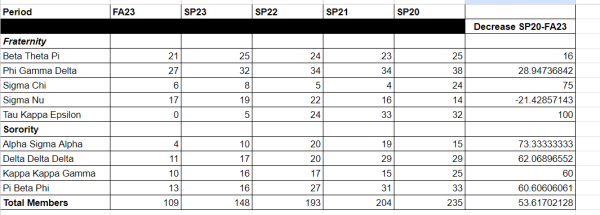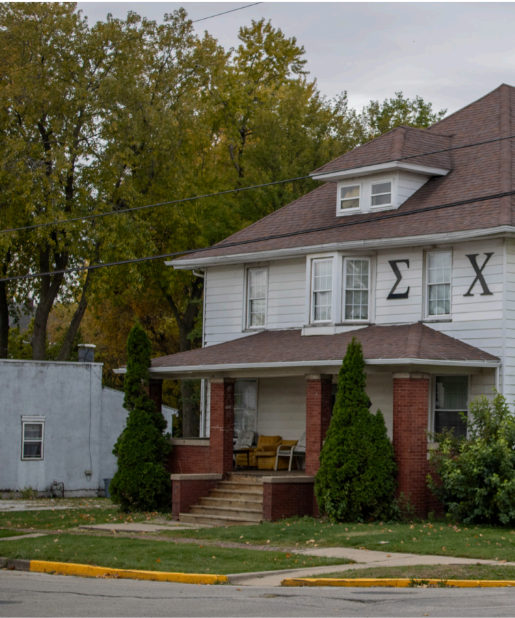Greek Life has suffered a decline of nearly 54% from Spring 2020 to Fall 2023. Fraternity and sorority members on campus suggest that Greek Life at Knox might be walking to its final days.
By observing the data of the sorority and fraternity life population from Spring 2020 to Fall 2023, it is evident that there is an overall decline in the number of Greek Life members throughout this period.
There are five fraternity and four sorority houses on Knox College campus. The fraternities are Beta Theta Pi, Phi Gamma Delta (FIJI), Sigma Chi, Sigma Nu, and Tau Kappa Epsilon (TKE). The sororities are Alpha Sigma Alpha, Delta Delta Delta, Kappa Kappa Gamma, and Pi Beta Phi.
Beta Theta Pi’s members declined by 16% throughout Spring 2020 and Fall 2023, Phi Gamma Delta’s by 29%, Sigma Chi’s by around 83% and Tau Kappa Epsilon’s by 100%. Sigma Nu is an exception to the member decline rates, having an approximate 21% increase in its population.
Alpha Sigma Alpha suffered a member decline of around 73%, Delta Delta Delta of approximately 62%, Kappa Kappa Gamma of 48%, and Pi Beta Phi of about 61%. Overall, the fraternities’ population in Knox College decreased by approximately 48% and sororities’ by about 60%. Altogether, FSL decline has been nearly 54% from Spring 2020 to Fall 2023.

A potential explanation for the Greek Life decline from Spring 2020 to Fall 2023 is the enrollment decline at Knox College. Knox has seen a drop of almost 400 students over the past ten years, most of it occurring in the past five. This problem is a consequence of the COVID-19 pandemic in addition to other factors such as a demographic cliff due to people’s decision to have fewer children in 2008. With fewer students at Knox, fewer students are here to join the fraternities and sororities, resulting in a FSL population decrease.
Since the pandemic of Covid-19 in Spring 2020, the recruitment levels of fraternities and sororities have been declining. Sophomore Avery Leigh, a member of Delta Delta Delta, said that it has been difficult to match up with the number of recruitments in the past, causing the decrease in the FSL population to be apparent.
“Since Covid, the recruitment classes have been a lot smaller, so I think working with a smaller tool and having restrictions based on Covid has made it a lot harder to do recruiting. And then I know that for Delta personally we had a really big recruitment in the past, and they [former members] have been graduating a lot and we haven’t been able to match up with the recruitment numbers, so it has just been declining,” Leigh said.
Covid-19 also restricted social activities on campus that attracted students to Greek life, a factor that may have resulted in fewer members wanting to join since Spring 2020.
“They would put the materials in our K-Box because we couldn’t have contact. We had to do the activities online, over Zoom, which was weird,” said Abigail Waltenberry, a junior and ex-member of Alpha Sigma Alpha, “Definitely not having like, a normal ‘be there’ interaction affected [the sorority population] and if you made the right choice of the sorority you got. I feel like for me I could not show [sorority peers] who I was”.
Darnell Centeno, a 5th-year member of Beta Theta Pi, said that even after the online era it was hard for fraternities to keep in contact with potential members because of the strict health safety policies. In addition to that, Centeno says that many students also did not want to risk putting their health in danger, which resulted in them not attending fraternity events.
“It definitely had an influence on the decline because even after post-Covid, when they started to open everything back up, it was still hard for fraternities to get out there and interact with people because of the policies, you know. … Seven feet, or you couldn’t do things inside, it was so many strict rules. …They did not want to go out there and risk themselves,” he said.
Another potential reason for a drop in sorority and fraternity enrollment is the price. To join FSL there is a new member fee that varies from $300-$600 and an active member fee paid by members every term, which varies from $100-500.
“As much as I enjoyed being in Alpha, I literally could not afford it, so I could not do it anymore,” Waltenberry, who left Alpha Sigma Alpha in Spring 2023, said.
Money is a major factor in students’ ability and willingness to explore or join FSL.
“It seems fun, like, I would [join a fraternity], but it costs money,” first-year Izayiah Hawes said when questioned whether he planned to join a fraternity in the future.
Centeno suggests that members might not want to join because fraternities have an increasingly negative reputation.
“One reason why I think the decline for many fraternities is because of the social image that they have, not just the fraternities individually, but what the people around them say about them,” Said Centeno. “Other fraternities just keep a bad reputation for fraternities in general.”
Sophomore Zach Benson, a member of Sigma Chi, proposed that in order to solve the reputation issue, it is necessary for the Greek Life community to come together and define their purpose as creating a fun and safe campus.
“The reputation here is that a fraternity will throw parties, and that’s basically it,” said Benson, “I think to solve that we need the fraternity and sorority community to come together and change our minds about our purpose. The number one thing should be just having a fun campus. (…) Just having fun things to do and people feeling safe on those events, I think that’s really the point that it should be [the purpose of Greek life on campus].”
Consequences
The consequences of the sorority life decrease for Kappa Kappa Gamma include the rise of the price per capita fee, charged according to the number of members of the sorority. That means that as Knox’s population of Kappa Gamma declines, the price per capita fee increases. Other consequences include sorority members having more than one position at once.
“I personally have four positions. I think two other people have four positions, “said Leigh, “It wasn’t like that before when we had more members. Before, everyone had just one [position]in the traditional setup.”
Benson stated that Sigma Chi members are struggling with the same issue. He proposes the idea of a loop, where new members do not want to join because there are not enough members.
“Well, you can’t really run a frat with six people. There are many different responsibilities and it makes it really hard to make parties and events,” Benson said.
Centeno suggests that fraternity life is facing a decline in popularity, consequentially “dying”.
“Fraternity life is dying, you know,” Centeno said. “People are less and less trying to interact with fraternities. It’s obvious that fraternities are trying to go out there and reach out, but people have been declining them.”
According to Leigh, there has been a big push by sororities to make sure that sorority life does not disappear from campus.
“I think there has been a really big push starting this year to really increase sorority involvement and sorority events… I think there’s a push right now to revamp and make sure sorority life survives at Knox,” Leigh said.








